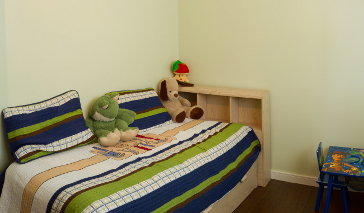Nighttime bed-wetting, also known as nocturnal enuresis, is common in children under six years old. Young children have trouble holding their urine at night, mainly because they are still establishing bladder control. When bed-wetting persists past the age of six, at times continuing into the teen and adult years, it is considered a medical condition. In such cases, there is often an underlying cause, such as a small bladder or a hormone imbalance.
Boys are more prone to nighttime urinary incontinence problems than girls. Some consistently wet the bed at night (primary), while others may be dry for six months before the condition recurs (secondary). Fifty percent of children who experience the latter have a family history of bed-wetting, implying that there may be a genetic component.
Causes of Nighttime Bed-Wetting (Nocturnal Enuresis)
Children who are bed-wetters can typically control their bladders during the day but not at night. Potential causes for this include:
- Trouble waking from sleep
- Anxiety, such as problems at school, home, or with friends
- A central nervous system that is not fully developed
- Decreased production of antidiuretic hormone (ADH), which is responsible for reducing nighttime urine production
- Urethral valve irregularities in boys, or irregularities in the ureter of either girls or boys
- Urethral obstruction due to stones, cysts, tumors, internal tissue growth, long-term inflammation, or scar tissue from surgery
- A small bladder
- Urinary tract infections
- Diabetes, which can cause overactive bladder, neurogenic bladder, and urinary tract infections
- Sleep apnea
- Ectopic ureter
- Maturational delay (the nerves that regulate the bladder mature slowly, preventing the child from recognizing when the bladder is full)
Nighttime Bed-Wetting and Associated Symptoms
The main symptom is involuntary urination; however, a variety of associated symptoms may reveal the underlying cause. The associated symptoms include:
- Snoring: If the child is wetting the bed and is also snoring, he might have obstructive sleep apnea-hypopnea syndrome. With sleep apnea, the child’s breathing is interrupted during sleep, frequently because his adenoids or tonsils have become inflamed. Besides snoring, the child could also have a sore throat, recurrent sinus and ear infections, and problems staying awake during the day.
- Painful urination: If it hurts when the child urinates, he could have a urinary tract infection. He may also start to have accidents during the day, and his urine may be bloody.
- Post-training incontinence problems: If a child develops bed-wetting problems after not having them, it could be a symptom of diabetes. Other signs to look for are weight loss (even though the child is still eating), fatigue, increased thirst, and increased urination.
Nighttime Bed-Wetting and Diagnosis of Underlying Cause
A physical exam, often followed by a urinalysis and urodynamic studies, allow a physician to check for signs of infection or diabetes, measure urine flow, and gauge bladder capacity. If a structural problem with the child's urinary tract is suspected, or if there are other health concerns, other tests may be performed. Additional tests may include:
- Ultrasound, which uses high-frequency sound waves to produce images of the kidneys and bladder
- Voiding cystourethrography (VCUG), which takes x-rays of the bladder and urethra before and during urination
- MRI, which uses magnetic energy and radio waves to create images of the urinary tract
- Cystoscopy, in which a tube tipped with a light and camera is inserted into the urethra to examine both the urethra and bladder
Nighttime Bed-Wetting Treatments
Treatment for nighttime bed-wetting (nocturnal enuresis) depends on the underlying cause. In cases where the condition is inherited, the child will likely stop bed-wetting around the same age the parent stopped bed-wetting. Still, there are a number of treatment options, including battery-operated moisture alarms, fluid management, bladder training exercises, and medication.
References:
Deshpande AV, Caldwell PH, & Sureshkumar P. (2012). Drugs for nocturnal enuresis in children (other than desmopressin and tricyclics). Cochrane Database Syst Rev.


